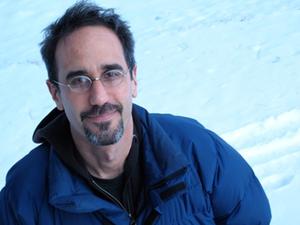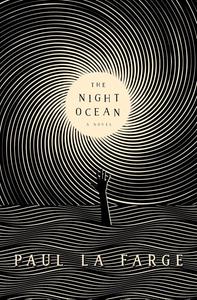
|
|
| photo: Carol Shadford | |
Paul La Farge is the author of the novels The Artist of the Missing and Luminous Airplanes, as well as The Facts of Winter, a "book of imaginary dreams." La Farge's newest novel is The Night Ocean (reviewed below), which follows the early 20th-century horror writer H.P. Lovecraft and his fans, especially his real-life contemporary Robert Barlow, and the fictional modern-day characters Charlie and Marina. La Farge delves into the controversial subjects of Lovecraft's racism, his potential homosexuality and the relationship between creators and their fans.
What's your personal history with Lovecraft? Did you ever, like many of your characters, reach a breaking point where you had trouble reconciling the man's odious beliefs with his unforgettable stories?
I first read H.P. Lovecraft's stories when I was 10 or 11--I'd seen Cthulhu in a rulebook for the game Dungeons & Dragons, and he (it!) seemed so intriguingly awful that I bought every Lovecraft book I could find. Something in his work rhymed with my experience of growing up in New York City in the 1970s and early '80s: the world was terrible. We were doomed. And because I was a nerdy kid, the idea that the universe had forbidden secrets, and that they were to be found in books, was enormously appealing to me. But actually, I wanted to be one of Lovecraft's insane cultists, not one of his bookish protagonists--the cultists were clearly the ones who were having all the fun. I'd like to say that the story which appears in The Night Ocean about a couple of kids going out at night in homemade black robes, carrying signs that read THE END OF THE WORLD IS NIGH--GIVE TO THE CULT OF CTHULHU, is fictional, but, alas, it happened.
Many years passed before I learned anything about Lovecraft's beliefs, and I'm grateful for the interval. By the time I read L. Sprague de Camp's biography, which was the first place where I learned much about Lovecraft the human being, my cultish admiration for his stories had already waned. So there wasn't really a breaking point, for me; my thinking about Lovecraft just became more complicated. Which is fine with me--the world is complicated. People are complicated, and their capabilities and contradictions are interesting, certainly to a fiction writer.
To this day, I re-read Lovecraft's stories with pleasure. I can do that in large part because I believe that fiction has a separate life from that of its creator: once you write a story, it becomes its own thing, which may be reprehensible, but only on its own terms. And when I'm deep in Lovecraft's biography, and the autonomy of his fiction impresses itself on me less strongly, I retain some tolerance for the stories by recalling that Lovecraft's odious beliefs did not lead him (so far as I know) to odious actions. In his dealings with actual, living human beings, he was at worst harmless, and often generous and kind.
While researching Lovecraft, Barlow and the other real-life characters in the book, did you ever find yourself immersed in the project in a way that threatened your health or personal relationships? I'm curious how much of your own tendencies and experiences made it into the book.
You should see my notes! I had the great good fortune to do most of the research for The Night Ocean over the course of a nine-month fellowship at the New York Public Library, which gave me access to a huge quantity of possibly relevant material, and to a staff of librarians whose job it is to help people like me track things down. I gave myself over as fully as I could to that space, and that experience, and yes, there were times when it seemed to me that no sane person would be trying to find out all the things I was trying to find out. (I have copies of the FBI files on several of my characters, to give you just one example.) I'm not sure my health was ever at risk, but I did sneak into Robert Barlow's house in Florida, which was abandoned at the time, and while I was taking pictures of Barlow's childhood bedroom I was sure I heard someone coming up the stairs....
That kind of thing doesn't happen to novelists very often. The more frequent and, in some ways, more serious peril of research is that, having amassed those heaps of shiny facts, a writer will feel obliged to put them all on display in his or her work. I was glad to run that risk here, because the historical material from which The Night Ocean derives its existence is so rich and weird that it beggared anything I could have invented, except in a few cases. That said, not everything I learned from the library, or from the world--after a certain point they started to seem like the same thing--found its way into the novel. But the many things I left out served as a kind of atmosphere, I think, in which The Night Ocean could be written. To this day, the idea that Lovecraft might have been gay is controversial among his fans and the horror community. Why was homosexuality such an important thread for you to emphasize throughout the book?
To this day, the idea that Lovecraft might have been gay is controversial among his fans and the horror community. Why was homosexuality such an important thread for you to emphasize throughout the book?
To answer this question, I should say something about how The Night Ocean came to be. I got the idea for the book from the poet Robert Kelly, who told me the story of Lovecraft and Barlow at dinner one night in the winter of 2005: the question of what had happened, of what might have happened between the two of them in Florida was a blank spot, in which I thought there might be room to write a novel. So Barlow's homosexuality, and Lovecraft's mysterious and mostly absent sexuality, were at the root of the project. Then, as I learned more about Barlow and about Lovecraft's circle of friends and fans, the thread of homosexual desire was just insistently there: Barlow really did teach William S. Burroughs, and Lovecraft's friend Samuel Loveman was gay, and Loveman was friends with Hart Crane....
I can't speak to the attitude of fandom as a whole with respect to homosexuality; in my experience, present-day fans are pretty tolerant of all kinds of queerness. The fans of the 1930s and '40s were certainly less tolerant, and their intolerance is an important part of my book: a lot of what happens in The Night Ocean is a kind of human equivalent or counterpart to Lovecraft's cosmic horror, and the prejudice against homosexuality pushes Lovecraft and Barlow's relationship into the very Lovecraftian territory of the unspeakable, the forbidden.
Which brings me back to the first part of your question, about Lovecraft's sexuality. From where I sit, the question of whether he was really gay or not isn't that important. In Lovecraft's letters, he abhorred homosexuality; but on the other hand, he doesn't seem to have been tremendously capable of heterosexual love, either. So for me, for my narrative, the vital question was, is this person capable of love at all? Under what circumstances? And what would it do to him, if he was? That's what Barlow--the Barlow character in The Night Ocean, I mean--is trying to figure out: "I love you. Can you love me back?" To me, that question is the most urgent thing in the novel, though neither you nor anyone else is under any obligation to agree with me.
Many of the characters in your novel have confused relationships with their own bodies, especially Lovecraft, who could seem almost inhumanly divorced from physical pleasure. How much of your characters' unhappiness do you think derives from this mind-body disconnect?
That's an excellent question, by which I mean that I'm not sure how to answer it. I don't think of Marina and Charlie as having confused relationships with their bodies, and neither does Spinks, really--he's handsome and knows it. Lovecraft does, of course, and surely his unhappiness is connected to his experience of his physical self. How could it be otherwise, when his mother told her friends that he was too ugly to go outdoors in the daytime? But in a way, I think Lovecraft's unhappiness comes less from the particulars of his physical self than from the simple fact that he had a physical self. A remarkable number of his stories are about minds which move from one body to another: even The Case of Charles Dexter Ward is kind of about that, in that Joseph Curwen takes the place of young Charles Dexter Ward. These are horror stories, of course, but I can't help wondering if there was some wish-fulfillment in them, too: if Lovecraft wouldn't have delighted in being a consciousness that could roam from body to body, from era to era. --Hank Stephenson, bookseller, Flyleaf Books

